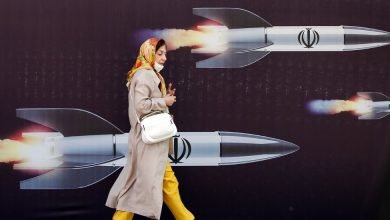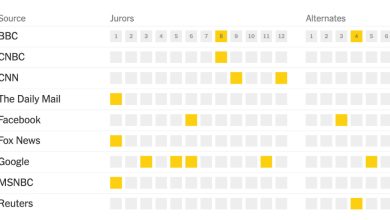From the Early Morning Sky, Shards of Hot Metal

SERHIIVKA, Ukraine — His forehead cut from his rescue efforts in the rubble of a hotel in this sleepy southern resort town, Oleksandr Mararenko carried out the bodies of a woman and child early Friday morning after a Russian missile attack.
“I could not even tell if the child was a boy or a girl because the body was so dismembered,” he said, as he pulled a helmet down to return to his bleak task.
The missiles, likely fired from the Black Sea, tore through the Godji Hotel and an entire section of a nine-floor apartment building, killing at least 21 people in one of the deadliest attacks on civilians since the war in Ukraine began more than four months ago. Rescue workers sifted through the debris for victims or, just possibly, survivors, for many hours after the attack.
Yellow cranes hoisted slabs of concrete from the twisted wreckage of the collapsed hotel; blankets and washing clung to the side of a listing apartment block; a purple curtain blown out by the shock waves hung eerily from a pine tree. Maple leaves blasted from trees formed a vast green carpet in the midst of the mayhem and bloodshed.
Residents said they had heard a siren followed by three explosions in quick succession. “I would bite them with my teeth, these barbarians,” said Nikolai Tyazhchenko, 71. He teared up as he gazed at a mountain of debris.
Anger ran high at what many people called the “Ruscists” — an elision of Russians and Fascists that is popular among Ukrainians — in a town that had been largely sheltered from the war up to now.
There were no apparent military targets in the vicinity of the attack about 50 miles southwest of Odesa. It came a day after Russian forces vacated Snake Island, a few dozen miles away in the Black Sea, following a persistent Ukrainian artillery bombardment.
Snake Island, captured by Russia in February, has assumed the status of lore in the Ukrainian war effort ever since a Ukrainian soldier posted on the strategic island used a powerful expletive to tell a Russian warship bearing down on him to get lost. The Ukrainian Postal Service issued a stamp showing the soldier making an obscene gesture to the Russian cruiser Moskva, which sank in April. The stamp has become a collector’s item.
“This was an act of revenge for the successful liberation of Snake Island,” Yevhen Yenin, the first deputy minister of internal affairs said in an interview. He scoffed at Russian claims that leaving the island was a gesture of “good will” to demonstrate that Moscow had no wish to blockade shipping lanes essential to the export of Ukrainian grain.
“This was not good will, it was our precision strikes” on Snake Island, he said. There was, however, no immediate evidence that this town was targeted in an act of Russian reprisal. Rather, the attack was of a piece with similar apparently random targeting of residential areas.
Better Understand the Russia-Ukraine War
- History and Background: Here’s what to know about Russia and Ukraine’s relationship and the causes of the conflict.
- How the Battle Is Unfolding: Russian and Ukrainian forces are using a bevy of weapons as a deadly war of attrition grinds on in eastern Ukraine.
- Russia’s Brutal Strategy: An analysis of more than 1,000 photos found that Russia has used hundreds of weapons in Ukraine that are widely banned by international treaties.
- Outside Pressures: Governments, sports organizations and businesses are taking steps to punish Russia. Here are some of the sanctions adopted so far and a list of companies that have pulled out of the country.
- Stay Updated: To receive the latest updates on the war in your inbox, sign up here. The Times has also launched a Telegram channel to make its journalism more accessible around the world.
President Vladimir V. Putin this week denied that Russia was responsible for indiscriminate attacks on Ukrainian civilians. “Nobody among us shoots like that, randomly,” he said, insisting that Russia targeted Ukraine on the basis of “intelligence data” and with “high precision weapons.”
The Kremlin’s spokesman, Dmitri S. Peskov, parroted the words of Mr. Putin on Friday, saying that Russian forces “are not working against civilian targets in the course of the special military operation” — the expression Russia uses for its invasion of, and war in, Ukraine.
From the start of the war, however, Russian forces have repeatedly shelled civilian targets — including apartment buildings, a railroad station, a theater used as a shelter, a shopping mall and a maternity hospital — and rendered some cities and towns uninhabitable.
The last holdout against Russia’s offensive in the Luhansk region of eastern Ukraine, the city of Lysychansk, came under the same heavy and indiscriminate shelling of civilian areas Friday that flattened its sister city, Sievierodonetsk, in fighting last month.
“The occupiers are destroying one house after another with heavy artillery and other weapons,” said the governor of the Luhansk region, Serhiy Haidai.
Standing in front of what was left of the apartment building in Serhiivka, Mr. Yenin said “their aim is to scare the Ukrainian people and put an end to our resistance. But the effect is the opposite. We will never surrender. This is our land.” Alluding to Mr. Putin, he said “Russian society has been poisoned by him.”
Clutching her five-year-old niece behind the residential building where her apartment on the second floor had been damaged, Oksana Sorochan, a seamstress, said: “I don’t understand much. I only understand that they are killing us, and that’s it.”
She was sitting with other survivors in a children’s playground where shattered glass lay between the swings and seesaws and slides. The concrete building, with its shattered windows and smashed satellite dishes dangling from it, loomed over them.
The soft summer sunlight and the shards of hot metal that descended out of the early morning sky seemed hard to reconcile. In fields opposite the building, fallen cherries and plums lay scattered across the rich earth.
“I don’t know why the Russians say they are protecting us from something,” Ms. Sorochan said. “Protecting us by killing us?”
Her niece, Margarita, looked up at her. “When will we go to town and get Mommy?” she asked. Ms. Sorochan had been looking after the girl for her sister, who lives in another town that the family had viewed as more dangerous.
The Sorochans, awoken by a siren and three explosions, had rushed to the cellar of the building. The daughter-in-law of their neighbor was killed, as were the parents of one of Ms. Sorochan’s friends. “We are afraid to stay here any longer,” said her father, Viktor Sorochan.
Another couple, Vyacheslav and Iryna Odaynik, approached. Do you live here? “We used to live here,” Mr. Odaynik said. They had left with their two children for Moldova in March. But the children were not happy and every now and again they would return for a weekend. “We were here a week ago and everything was peaceful,” he said.
Now they were back again to assess the damage in their seventh-floor apartment, but had not yet been allowed in. Mr. Odaynik gazed up at it.
Mr. Sorochan said, “Putin wants to capture Ukraine, all of it.”
More than four months into the war, most Ukrainians seem to see no end to it, even as they express an ironclad conviction that victory will be theirs. Families are scattered. Nowhere seems entirely safe, not even a small summer resort at the southwestern corner of Ukraine, far from the war of attrition in the Donbas. The weapons Ukraine has are insufficient for a broad counterattack, although driving the Russians from Snake Island illustrates the depth of the country’s resistance.
“We need more support from the West, and we urge our allies to speed up shipments of weapons that are desperately needed,” said Mr. Yenin, the deputy minister. “These are critical weeks of the war.” He added that the Russian rockets “were fired from the Black Sea.”
A large piece of shrapnel had lodged in a tree not far from him, perilously poised. Down the street, an investigator collected shards of shrapnel, measuring them and arranging them by size. It seemed painstaking work, like that of the rescuers digging deeper into the collapsed hotel, unsure what they would find.
Alla Beshentseva, 52, watched the rescue work from under a tree. She has lived in the town for 33 years, working in a sanatorium. “I am so stressed,” she said. “I have not fully realized the extent of what happened.”
She seemed inconsolable. The unthinkable — death delivered from out of a clear sky and for no reason — is now the day-to-day reality of Ukraine.
Alan Yuhas contributed reporting from New York.




